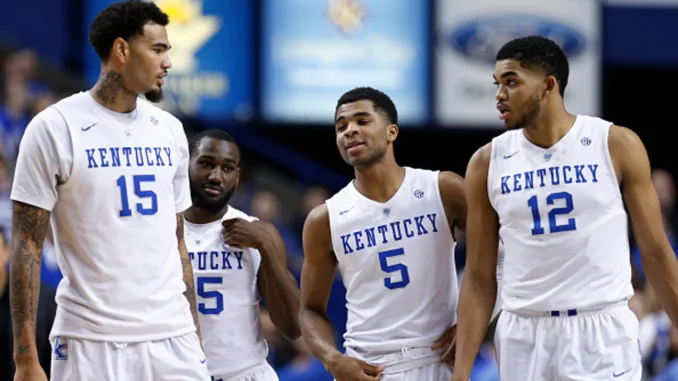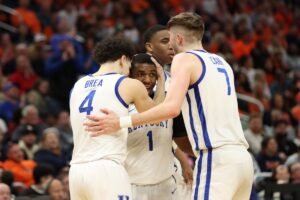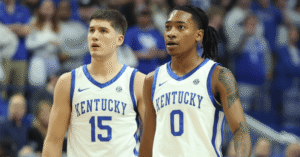
Legacy Worn with Pride: Ranking the Greatest Number 15s in Kentucky Wildcats History
The No. 15 jersey at the University of Kentucky is more than just a number. It’s a badge of honor, worn by some of the most memorable names to ever step onto the hardwood in Lexington. From national champions to defensive juggernauts and game-changing freshmen, the lineage of No. 15 stretches across generations, echoing the proud tradition of Kentucky basketball excellence.
As part of TrendySoccerNews.com’s summer series celebrating the legacy of college basketball’s most storied program, we dive deep into the legacy of the Wildcats’ most iconic jersey numbers. Today, we shine the spotlight on those who wore No. 15—players who etched their names into the rafters of Rupp Arena with grit, dominance, and brilliance.
But with rising star Reed Sheppard recently making his mark and the shadow of his father Jeff Sheppard still looming large, the debate has been reignited. Can father and son both land in the all-time top 5 for No. 15? Based solely on their collegiate careers at Kentucky, here’s how the legends stack up.

5. Jeff Sheppard (1993–1998)
When you think of clutch moments in Kentucky basketball, Jeff Sheppard’s name often surfaces. Over the course of five seasons, Sheppard evolved from a solid contributor into a tournament hero. He played 139 games and scored 1,091 points, but it was his performance in the 1998 NCAA Tournament that truly defined his legacy.
As the Most Outstanding Player of the Final Four, Sheppard led the Wildcats to a national title and cemented his name in Big Blue history. His leadership, cool under pressure, and knack for delivering when it mattered most make him an easy selection at number five on our list.
Ironically, while his son Reed dazzled in his own freshman campaign and showed immense promise, Dad still edges him out—at least for now.
4. Ed Davender (1984–1988)
Davender was a steady offensive engine during his time at Kentucky. Often underrated, his career stats speak volumes. With 1,637 points in 129 games and multiple All-SEC selections, Davender was more than a complementary piece—he was a consistent star during the mid-1980s.
While he never hoisted a championship trophy, Davender’s elite scoring ability and consistent presence on SEC honor rolls secure his place in the top five. He carried the offensive load in an era brimming with talent and carved out a reputation as one of the program’s smoothest guards.
3. DeMarcus Cousins (2009–2010)
In just 38 games, DeMarcus “Boogie” Cousins left an impression that could rival players with four-year careers. A force of nature in the paint, Cousins brought unmatched physicality and skill to John Calipari’s first Kentucky team.
His 575 points, All-American recognition, and SEC Freshman of the Year award only scratch the surface of his impact. Every possession with Cousins on the floor was a potential highlight, and his presence helped propel Kentucky back into national contention.
Even in his brief college stint, his dominance was impossible to ignore. That kind of excellence, no matter how short-lived, demands a place near the top.
2. Willie Cauley-Stein (2012–2015)
Few players have combined defensive brilliance with sheer athleticism the way Willie Cauley-Stein did. Over 105 games, he scored 843 points, but it was his defense that defined him. As the 2015 National Defensive Player of the Year, Cauley-Stein’s ability to guard all five positions made him a unicorn before the term became fashionable in basketball circles.
A First-Team All-American, SEC Defensive Player of the Year, and SEC Tournament MVP, Cauley-Stein anchored some of Kentucky’s most fearsome teams, including the 2014–15 squad that nearly went undefeated. He wasn’t just a rim protector; he was a game-changer, a momentum shifter, and the heartbeat of his team’s defensive identity.
1. Alex Groza (1944–1949)
Before the modern era of college basketball took shape, Alex Groza set the bar impossibly high. A two-time NCAA Final Four Most Outstanding Player and the 1949 Helms Foundation National Player of the Year, Groza was a dominant presence in the post-war era.
With 1,744 points in 120 games and multiple All-American selections, Groza helped put Kentucky on the national map. His leadership on and off the court led Kentucky to back-to-back national titles, and his scoring prowess in an era before the shot clock or three-point line makes his numbers even more impressive.
In the pantheon of Kentucky greats, Groza remains a foundational figure—a player whose legacy is not only respected but revered.
Honorable Mentions: Reed Sheppard and Melvin Brewer
Though not quite cracking the top five—yet—Reed Sheppard’s freshman season turned heads. Named National Freshman of the Year, he showcased elite shooting, court vision, and poise beyond his years. If he returns for another season and builds on that momentum, a spot in the top five may soon be his.
Melvin Brewer, who played in the early 1940s, also deserves recognition. He brought strong tournament play and helped set the stage for the Groza-led dominance that followed.
The Complete Legacy of Kentucky’s No. 15 Jersey
Over the decades, No. 15 has been passed down from one Wildcat to another, worn with pride and elevated by performance. From names like J. Rice Walker in the 1930s to recent standout Reed Sheppard, the jersey has witnessed triumph, transformation, and tradition.

A full roll call includes:
-
J. Rice Walker (1935–1938)
-
Stan Cluggish (1938–1940)
-
Melvin Brewer (1940–1943)
-
George Vulich (1943–1945)
-
Alex Groza (1944–1949)
-
Reggie Warford (1972–1976)
-
Steve Williams (1976–1977)
-
Chris Gettelfinger (1977–1981)
-
Ed Davender (1984–1988)
-
Jeff Sheppard (1993–1998)
-
Matt Heissenbuttel (2000–2004)
-
A.J. Stewart (2007–2009)
-
DeMarcus Cousins (2009–2010)
-
Willie Cauley-Stein (2012–2015)
-
Isaac Humphries (2015–2017)
-
Reed Sheppard (2023–2024)
-
Ansley Almonor (2024–2025)
Every name adds to the mystique of the No. 15 legacy. And while Alex Groza remains the gold standard, the jersey continues to carry the weight of greatness with every generation.
So, can Reed Sheppard eventually surpass his father Jeff? Can Ansley Almonor write his own chapter in the years to come? One thing’s for sure: the story of No. 15 is far from finished.
Stay with TrendySoccerNews.com as our summer series continues, breaking down the greatest Wildcats by jersey number. Tomorrow, we turn the page to a new digit—and perhaps a new legend.
Leave a Reply